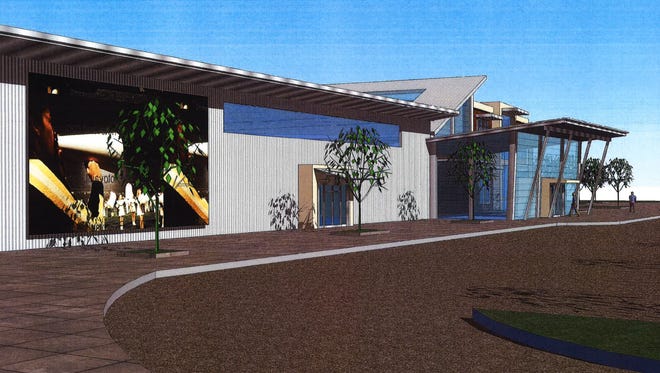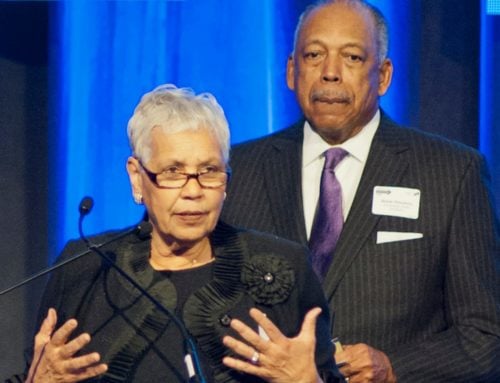Kate Talerico | Courier Journal
Published: 12:11 p.m. ET Jul. 2, 2018 Updated: 12:17 p.m. ET Jul. 2, 2018″
While the new LouCity stadium is transforming Butchertown, track and field might just be the sport to change the face of the Russell neighborhood.
On Tuesday, Louisville Metro Council voted to grant city land to the Louisville Urban League for a proposed $30 million track and field facility at a vacant property on 30th Street and Muhammad Ali Boulevard. The council also approved to fund it with a 20-year $10 million Metro bond to be sold late in this fiscal year or in FY2019-20.
The Urban League’s complex would include a 200-meter indoor track and a 400-meter outdoor track with 4,000 seats between the two. The development would also offer retail space, office space that would serve the track and parking.
The project fits into Mayor Greg Fischer’s greater strategy to revitalize Russell with new community spaces. In recent months, Russell unveiled a $600,000 renovation to Sheppard Park, and received a $29.5 million federal grant to revitalize Beecher Terrace and the surrounding area.
The site of the track, Heritage West, is the same location of the proposed $35 million FoodPort. That project, a cornerstone of Fischer’s vision for the West End, was quickly shut down after a key tenant pulled out of the deal, Courier Journal previously reported.
Sadiqa Reynolds, executive director of the Urban League, said the facility has the potential to bring in high school and college sporting events that could spur economic development in the surrounding blocks.
“The sports part is very key, but it’s not the only key,” she said. “It’s about economic development and economic opportunity.”
The Urban League is working alongside the Louisville Sports Commission to lure potential organizations to the city, should the facility receive enough funding for its construction.
“We helped the Urban League look at what kind of features you need in a championship facility,” said Karl Schmitt, Jr., president and CEO of the Louisville Sports Commission. So far, the commission has garnered interest from groups like USA Track and Field and the NCAA. The facility could accommodate other activities, like volleyball, boxing and concerts, during the summer months, he suggested.
The Urban League is also working alongside the National Development Council, a nonprofit economic development agency that helps bring private capital into overlooked communities. Funding will also come from corporate sponsorships, such as the naming rights to the complex, social impact investors, philanthropy and investment aided by the Community Reinvestment Act.

The sports facility brings a much-needed community space to the West End, Reynolds said.
“Imagine kids in the West End walking into this facility and seeing major athletes running in their community,” she said. “Seeing U.S. track and field athletes playing in your community, seeing your communityon television — it’s a big deal.”
Shandy Boyd Smith grew up in west Louisville and went onto become a national track star and inductee in the Kentucky Athletic Hall of Fame.
“For many years, the street was my track,” she said.
Track offered her a way to see the world. She said this track and field facility could do the same for others.
“It’s not necessarily about track,” she said. “We’ll be able to have so many events there that will open up avenues for economic growth and education for community.”
That’s the goal, Reynolds said. While the Urban League does build and rehab affordable housing through its economic development arm, Rebound Inc., the track facility would be its largest development endeavor so far, Reynolds said. But that’s why they have signed on with Brown Engineering and Construction to manage the project. Moody Nolan will design the facility.
The Urban League’s proposal estimates an annual revenue of $493,000, and operating expenses of $495,000, meaning it would operate at a loss of $1,650 each year.
The site was formerly home to a warehouse where the National Tobacco Co. dried and packaged leaves from Kentucky tobacco farms. Because it was a former industrial site, the land will most likely have to undergo some sort of environmental reconciliation, Reynolds said.
While the surrounding area is currently residential with few commercial venues for the crowds of families that inevitably gather for a race, Schmitt says that the location doesn’t pose a problem.
“There are sports facilities in different types of neighborhoods all over the world,” he said. “That’s rally not a detriment to the facilities.”
Additionally, surrounding schools are in need of a facility for practices and meets during the indoor track season, which runs from November to late March, Schmitt said. The athletic directors of the University of Louisville and Spalding University signed letters of support for the project, sent to the city when it was reviewing proposals for the space.
The city also considered a possible grocery store, biotechnology lab facility and community garden for the space. After receiving community feedback and evaluating the various proposals, the city selected the Urban League’s plan.
In the next months, the Urban League will work to obtain any necessary zoning changes or construction permits. It must provide proof of financing by Dec. 31, according to a development agreement between the Urban League and LMG.
“It feels so good to create something that would bring this kind of traffic into the West End,” Reynolds said.
Reach reporter Kate Talerico at [email protected], 502-582-4352 or follow her on Twitter at @k_talerico.

